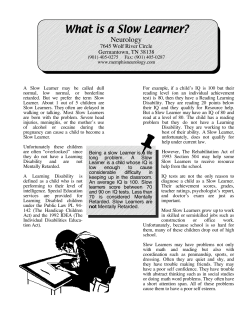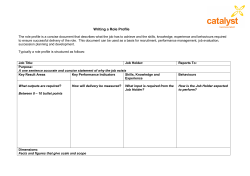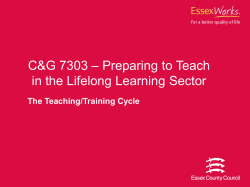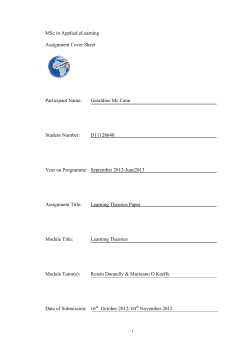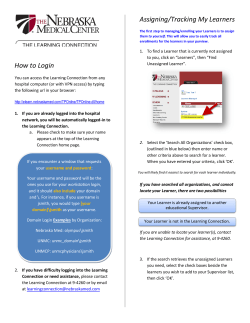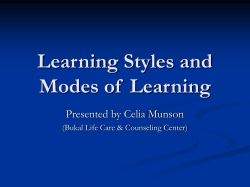
Community Education Foundations and threories
Community Education Practice and Principles IDEAS AND THOUGHTS FOR CONSIDERATION AND REFLECTION ON COMMUNITY EDUCATION Conclusion – looking at the definition of Community Education by CEN “Community education is a process of personal and community transformation, empowerment, challenge, social change and collective responsiveness. It is community-led reflecting and valuing the lived experiences of individuals and their community. Through its ethos and holistic approach community education builds the capacity of groups to engage in developing a social teaching and learning process that is creative, participative and needs-based. Community education is grounded on principles of justice, equality and inclusiveness. It differs from general adult education provision due to its political and radical methodologies.” Locating Community Education Community Education Education Adult Education including 3rd level Broader ideas related to Adult Education Malcolm Knowles Andragogy – working with ‘mature’ adults not Pedagogy • As autonomous individuals self directed • Experience • Chosen to learn and therefore are ready to engage motivated • Focus is on problem - solving • Learning must be relevant • At centre of own learning – learner contracts Ivan Illich Associated with the concept of dismantling the idea and institution of school • Teaching is in need of ignorance to justify itself and must create it - so no amount of reform will change that Proposed a learner centered system outside of institutions • Learners connected through conviviality • Learner-centred education via the web - Open Source Transformation as a part of Adult Education – Community Education Paolo Friere Jack Mezirow Education as an Transformation Phases in transformative education process intervention Liberation Problem posing internalised oppression Conscientization Social Transformation Praxis (Disorienting dilemma - Reintegration of new learning) Learning (RE-thinking assumptions – perspective transformation – change) Community Education as Taking Sides Jane Thompson Michael Newman • Women’s learning linked • Adult Educators need to to bringing about changes liked to socialism and equality • Education should be linked to social movements for change • Overtly linked to leftist views of society (Critical Theory / Frankfurt School) actively challenge oppression and oppressive perspectives • Sees Educators as needing to teach defiance and methods to be defiant in order to challenge inequality and bring about social change • Overtly inked to leftist views of society (Critical Theory / Frankfurt School) Community Education Learner-Centred Approaches IDEAS AND THOUGHTS IN RELATION TO LEARNER CENTRED FOR CONSIDERATION AND REFLECTION What to pay attention to? The Task Learning / The Programme or Curriculum Individual Group (Process) Person / Learner The Class / The Group Paying attention Learners Needs Learning styles ‘journey’ the Learner is on Learner taking up a role in the Class Maslow’s hierarchy of needs Styles Mezirow’s phases Formal roles Informal roles • • • • Visual • Maps, diagrams, charts Aural / Auditory • Heard or spoken Read / write • Words in a written form Kinesthetic • (Experience and Practice) VARK Paying to the Individual (learner) Paying attention to the needs of the Learner perhaps the lower ones in Maslow Hierarchy for Community Education means the learner will be comfortable / safe the Learning styles of participants means that content will be delivered in a way that is more acceptable to the learner the ‘journey’ the individual is on (Mezirow) means that learning is wider than the classroom the individual taking up a role in the class / group means that this can be used as learning Paying attention to The Group at task level Tuckman (1975) Stages 1. 2. 3. 4. 5. Forming Storming Norming Performing Adjourning / Ending Garland, Jones and Kolodny (Boston – 1978) Stages 1. Pre-Affiliation 2. Power and Control (Trust Testing) 3. Intimacy (Mutual support) 4. Differentiation (Challenge and change) 5. Separation Paying attention to the Group at a psychological level Jarlath Benson Bion Will Anxiety in Groups 1. 2. 3. 4. 5. 6. Mobilise power Separate Differentiate Action Compete Judge Love 1. 2. 3. 4. 5. 6. Unification Connecting Understanding Fusing Uniting Relating Basic assumptions Dependence / Independence Fight / Flight Pairing One-ness* Me-ness* The Group - Paying attention Paying attention to the stages of group development (Tuckman and Boston Model) might allow you to understand group behaviour and support the group to understand it too! Paying attention to Psychological aspects will support you to avail of behaviour in the ‘here and now’ as a rich vein of learning and development Paying attention to the Content Content –The syllabus and the programme • • • Material to be covered Learning Outcomes Exams to be passed • • • Projects Tests Assignments Content –The People Learners • Their experiences • Their desired outcomes Tutor • Insights • Knowledge • Principles and values Paying attention – The Content Paying attention to the content means that the learner will consciously learn what they agreed to come and learn Community Education Social Action Model WHAT IS IT AND HOW DOES IT OPERATE WHAT TO PAY ATTENTION TO?’ FOR CONSIDERATION AND REFLECTION Broad ideas of Social Action Max Weber (1864 – 1922) An act which takes into account the actions and re-actions of others and is therefore orientated in its course. Rational actions – leading to a valued long-term goal (principled) Instrumental – leading to short-term goals (pragmatic) Assumptions We are social animals How we behave effects others – negatively and positively Society is unequal In order to make society more equal we must engage in taking social (as opposed to Individualised) action from the side of the less equal These actions are about bringing about (positive) social change (equality) Models of Community Education - Lovett Community Education as a Service Community Education for Social Change Community Organisation Model Community Action Model Education to people in local areas (often by outside providers) Community ‘Development’ Model Focus on addressing local social exclusion with some instrumental learning Social Action Model Working closely with local groups to Focused on academic education for co-ordinate and provide local the working class to create services to address local problems fundamental social change Paying attention Paying attention to the Broad thinking of ideas of society links this work to wider ideas of society and working to make society better (social change) The models of community education leads to a greater consciousness of what the work is about Social Action Model – Practice ideas (Sowing the Seeds of Social Change) Setting up the Course / Class Reaching disadvantaged learners Social Recognition and attention to barriers In the Classroom Fostering critical reflection Experiential learning Beyond the Classroom Preparation for community development and social change In the classroom Making use of experience Making use of life’s experiences as learning Making use of life’s experiences as data for more learning Fostering critical reflection Moving from object to subject – Freire Looking at who we are, why we are like that and what contributes to that? Moving from understanding to criticising (critique) Consciousness / Awareness raising Moving from critique to possible solutions Social Action in the Classroom - Conclusion The work is about: Supporting / Provoking Learners to reflect and think about their assumptions and their life’s experinces Supporting / Provoking Learners to critique their thinking and assumptions Supporting / Provoking Learners to use their experiences to develop thinking at a social, cultural, political and economic levels Supporting / Provoking Learners to try out new ways of being and acting In Ireland this is about Consciousness (Awareness) raising and critical reflection Social Action beyond the classroom Preparation for community development and social change Moving from possible solutions to actions Focus on the collective rather than the individual Focus on broader ideas of Justice, Equality rather than personal progression Focus on long-term impact and change rather than short term outcomes Getting involved There is a merging of the Class and the Centre / Organisation – the Centre / organisation needs to be involved too!!! Social Action beyond the Classroom - Conclusion The work is about: Knowing the issue Knowing the different structures Strategising where to get involved and building alliances Linking the local to the National/Global and the particular to the policy/idea In Ireland it is about Active Citizenship and Community Development Broad Conclusion Community Education is about : Reaching marginalised communities and individuals 1. 1. 2. Related to access Related to taking a Learner Centred Approach Building their capacities to understand themselves and the society they are in 2. 1. 2. Related to taking a Learner Centred Approach Related to Social action Engage in taking action to change that society 3. 1. Related to Social action Bibliography Aontas. (Bailey, N. Ward, M. and Goodrick, M.) (2011) Sowing the Seeds of Social Change – the outcomes and Impact of a Social Action Model of Community Education. Dublin Aontas Benson, J. F. (1991, 1997). Working More Creatively with Groups. London, England: Routledge Bion, W. (1961). Experiences in Groups and other papers. London: Routledge. Brookfield, S. D. (1990). The Skillful Teacher - on Technique, Trust and Responsiveness in the Classroom. San Francisco CA, Oxford England: Jossey-Bass (2nd Edition 2006) Brookfield, S. D. (2012). Teaching for Critical Thinking – Tools and Techniques to help students question their assumptions. San Francisco CA: Jossey-Bass Freire, P. (1972). Pedagogy of the Oppressed. London: Penguin Education. Garland, Jones and Kolodny (1978) A Model for Stages of Development in Social Work Groups. In S. Bernstein (Ed) Explorations in Group Practice (p 12-53) Boston University of Social Work, USA Harvey B. (1998) Working for Change – A Guide to Influencing Policy in Ireland. Combat Poverty Agency, Dublin Hope A. and Timmel S. (1984) Training for Transformation – A Handbook for Community Workers Book 1. Mambo Press, Zimbabwe Illich, I. ((1971) Deschooling Society. London: Penguin Education Mezirow, J. (1991). Transformative Dimensions of Adult Learning. San Francisco, CA: Jossey-Bass. Newman, M. (1994, 2007). Defining the Enemy - Adult Educatioin in Social Action. Sydney: Stewart Victor Publishing ; also on-line: Michael Newman (www.michaelnewman.info). Newman, M. (2007). Teaching Defiance - Stories and Strategies for Adult Educators. San Francisco: Jossey-Bass. Sheehy M. (2001) Partners Companion to Training for Transformation. Partners Training for Transformation, Dublin Tuckmann, B. (1965). Developmental Sequences in Small Groups . Psychological Bulletin Vol 63 (6) , 384 - 399. Zastrow C. (2009) Social Work with Groups – a Comprehensive Workbook. CA, USA . Brooks/Cole Centage Learning .
© Copyright 2025


